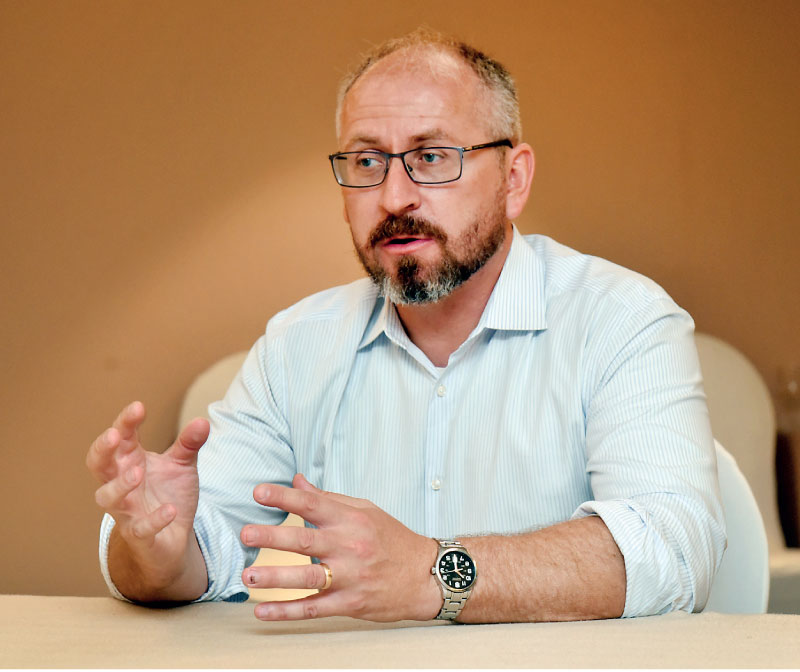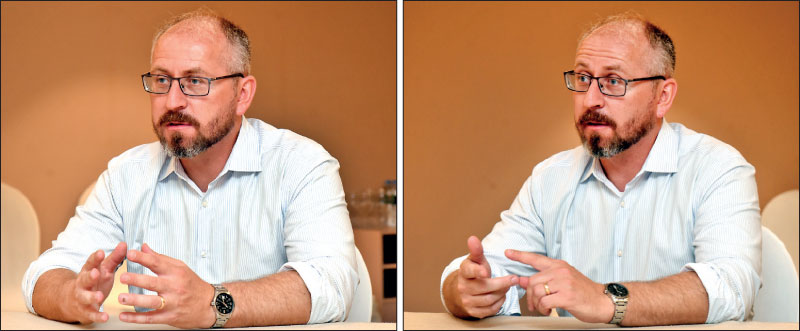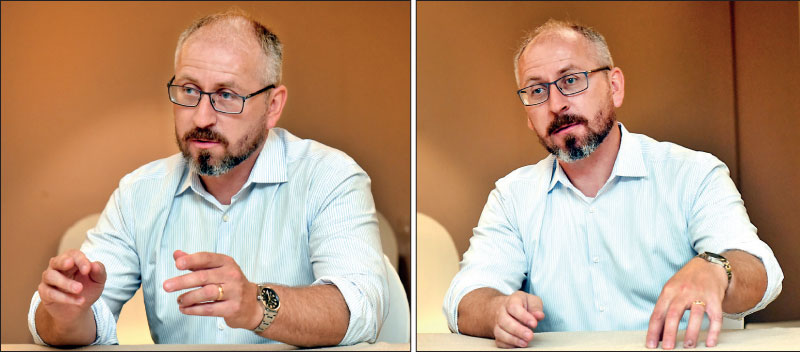Friday Feb 20, 2026
Friday Feb 20, 2026
Monday, 30 October 2023 00:00 - - {{hitsCtrl.values.hits}}

The Institute for 21st Century Questions President Dr. Irvin Studin - Pix by Ruwan Walpola
“Closure of school which was a historic mistake of the policy makers will go down in history as the major mistake of the 21stcentury for so many countries,” reflected Dr. Irvin Studin who was in Sri Lanka on a brief visit recently on the invitation of the Bandaranaike Academy for Leadership and Public Policy.
A Canadian academic, writer, publisher, think tank president and a soccer enthusiast, Dr. Studin chairs the Worldwide Commission to Educate All Kids (Post-Pandemic), an international initiative to address the catastrophe faced by millions of children ousted from all forms of schooling during the COVID-19 pandemic. He is also the founder, editor-in-chief and publisher of the Global Brief magazine and President of The Institute for 21st Century Questions- a leading Canadian think tank. Dr. Studin was a professor and program director at the School of Public Policy and Governance, University of Toronto from 2009 to 2014 and a visiting professor at leading schools of public policy in North America, Europe and Asia.
Following are excerpts from the exclusive interview he had with the Daily FT:
By Randima Attygalle
Q: It is your first visit to Sri Lanka and how fruitful has your brief stay in the island been?
Sri Lanka is such a beautiful land of warm hospitality. I find the country’s history very interesting. Sri Lankans are a very talented population and the challenges faced by them are many. Some of the challenges are familiar, particularly, in the sphere of education. During my stay, I had the opportunity of meeting the Prime Minister, the Leader of the Opposition, some top policy-makers, business leaders and students. We talked about education, governance and policy making and those dialogues have been very stimulating.
|
Q: One of the highlights of your stay was your dialogue with some of Sri Lanka’s top policy makers about the key issues faced by the Sri Lankan education system and the remedial measures that are urgently needed. What are your observations about the COVID-induced education dilemma faced by Sri Lanka?
Across the globe the education catastrophe was the biggest, even bigger than the economic catastrophe in the post-pandemic setting. Unfortunately, South Asia suffered most of all in the education space. Sri Lanka closed schools for nearly two years. It is estimated that more than half a billion children around the world were ousted permanently from education during the pandemic, the state we call the ‘third bucket.’ (The ‘first bucket’ is physical or classical school enjoyed by children prior to the pandemic and the ‘second bucket’ is virtual or online school).
When schools were ‘indefinitely’ closed, millions of children defected to the third bucket, deprived of any access to a device for online education. The defection to the third bucket was notable in South Asia including Sri Lanka. On the other hand, kids who remained in the second bucket were also under-educated; they didn’t have proper habits, proper routines and thus emerged poor discipline, poor self-confidence. Yet, they have to face a world, in a secular sense, more difficult than that of the pandemic. Sri Lanka’s economic crisis, social unrest coupled with a sense of social depression, all became a double whammy on its education. This is a catastrophe the country has to reckon with. Education is a critical feeder and if Sri Lanka is to get out of this crisis and fend for itself and stand up as a nation, it is only through an educated population. Therefore, doubling down on education is very critical; however, so far this doesn’t seem to be a visible priority in the country.
Q: Can you throw some light on the mandate of the Worldwide Commission to Educate All Kids (Post-Pandemic) chaired by you?
Since its launch in January 2021 in Canada, Worldwide Commission to Educate All Kids (Post-Pandemic) has been the leading international forum and structure for bringing acute awareness to the fact and consequences of hundreds of millions of ‘third bucket’ children around the world. Our mandate also includes finding solutions and reintegrating education and to ramp up energy into education. We have top representatives from over 60 countries with us and Sri Lanka was among the first to join through the presence of the former Secretary to the Education Ministry, Dr. Tara de Mel. South Asian representation with the Commission is quite strong.
We put together the Commission to first diagnose the catastrophe of the pandemic because nobody understood what was happening to young people when they closed schools. When schools were said to be ‘indefinitely closed’ that sent children to an abyss as there was no proposition of a return. The adult mistake of closing schools entailed two key problems: we underprepared kids for a more difficult tomorrow and at the same time, we over-prepare them for a difficult tomorrow. In most cases the gap between the needs of the post-pandemic world and the preparation of the third bucket children is a misery gap.
Most governments including Sri Lanka and my own country Canada, have not realised the extent of the problem and have not pivoted high energy out of the pandemic into education. The curriculum has not changed, the motivation has not changed, energy has not changed but there is limited time until the child goes out into the adult world. The child is underprepared and we are all aware of the consequences: low literacy, low employability, low social indicators and lower life expectancy.
Let us ponder if anyone would desire to invest in a country where its children are uneducated or undereducated. The answer is no. Potential investors will look out for countries where the education system did not collapse. Today, Asia is the major continent of the 21st century but people don’t realise that Asia suffers because of education collapse and education doesn’t seem to be a priority, particularly, in South Asia. India, for example, regardless of its status as the Asian giant is going to face a very difficult tomorrow although they may not still realise it, because education catastrophically collapsed during the pandemic. Yet, China and Singapore remained resilient without compromising their education at any cost. Even today there are schools in very dire circumstances, yet adamant to continue. I can think of Ukraine here, where they created a series of classrooms under a metro system to counter bombing. The world should never repeat the mistake of closing down schools unless in an extraordinary case. Even then, children need to be assured that schools will reopen soon and hope need to be sustained along with public commitment that schools will never be closed indefinitely. In the post-pandemic setting, we need to inject maximum energy to education transcending regions; there needs to be energy thrust into the curriculum, extracurricular activities, sports, theatre, music and so on. It should be energy, energy and more energy!
|
Q: You have been very vocal about calling school closures as a ‘historic mistake of policy makers’. Just as much as it created a sizable population of third bucket kids, do you also see this historic mistake causing irreversible damage to kids in the second bucket or those who had access to online education?
COVID-19 made us privy to two scientific paradoxes. Firstly, any intelligent society could see statistically after a couple of months’ observation that COVID-19 was not so harmful to kids. But even after such observation, most intelligent societies doubled down on stake, doubled down on social and physical distancing, closing of schools, etc. Secondly, we also followed some epidemiology. Epidemiologists didn’t know physics and physicists didn’t realise they were not relevant to public policy. Doctors were closing systems they didn’t understand and didn’t see the causing consequences for which they were negligibly accountable. The policy makers who were accountable for the education systems didn’t have any literacy science so they didn’t have counter arguments and there was a general mania caused about COVID and obviously amplified through social media. Schools were the lowest hanging fruit to close without thought but consequences were the most painful because they would bleed into every system in very large numbers. In certain countries, boys left for labour force, girls opted for early marriage, teachers disappeared and in some countries such as Uganda, even school buildings disintegrated.
Particularly for teenagers, school lost its meaning during the pandemic. In the physical classical school, many things would bring you back to school, teachers, peers, girlfriends, boyfriends and so forth. But this was not the case with online learning. Even for star performers it was only a matter of a few days to become third bucket kids if they lost purpose or life became mundane without their routine school activities. It was even more painful for kids coming from abusive homes. The proportion of abusive homes is as large as in advanced countries as it is in South Asia. Unlike a child dropping out of physical school in the pre-pandemic era, such defection from online schooling to the third bucket is treacherous as it was often ‘silent’. Nobody would know if the child has left education and no one is on the look for the child. Even after such children return to school, fitting into a system having missed several years of school, would be a gruelling task. Second bucket children with a particular physical or an intellectual disability and some emigrant children without their language of instruction on virtual learning platforms were equally at the receiving end. Closure of school will go down in history as the major mistake of the 21stcentury for so many countries. The major learning outcome of the pandemic is never to close schools again. After each war catastrophe the world has seen genocide conventions, weapon conventions and this time it is going to be schooling conventions because the consequences and learning curves have been tremendous.
Q: In the rat race of ‘over educating’ children, especially in the post-pandemic world as a means of compensating for the lost years, creative intelligence of children is often undermined. Particularly, in settings such as ours where education is so polarised, this aspect is grossly overlooked. What are your thoughts?
One of the things we learnt during the pandemic was that scientists became very relevant but they don’t know anything about public policy. But policy makers could be scientific illiterates at the same time! These two solitudes not being able to speak to each other brought forth terrible results. This is true in most countries. This is an education problem. This needs to be rectified so that science and humanities would constantly interact. However clever you are in physics or biology, if you cannot write, if you don’t know philosophy or ethics, how societal systems work, then you are speaking a very narrow vernacular. It doesn’t translate well in places where your scientific knowledge is needed. So, there must be a society which could provide solid feedback on corrective measures for which creative intelligence is a must. Sri Lanka can be a forerunner in this with strong leadership. Right now, Sri Lanka is in a very complex situation and it is essential to ramp up the country’s education holistically.
Q: As a scholar with special interest in public policy and governance, how imperative do you think it is for all voices including those with disabilities, the marginalised and the youth to be heard when policies of a country are formulated?
Most policy making democracies are insular. There is an elected or appointed elite that makes policies, and over time they tend to sit in closed rooms and away from the public. As the people in imperial China used to say, ‘the emperor is very far’. This means that the emperor cannot know the local reality. In the event of a democratic system as in Sri Lanka, the advantage is you can get feedback from the population more efficiently than in a non- democratic space. How you do it depends on the mechanism and the quality of the leadership. A lazy method of doing it today is through social media. But it is still a way. But the most classical way is to meet with people and have long discussions before polices are made and particularly, before they are announced. In this manner mistakes could be rectified, an advantage you find in a democratic space.
Q: As one time member of the first ever external advisory board of the Canadian Foreign Service Institute, do you believe that the traditional role of a diplomat should evolve to embrace modern-day challenges?
I’m positioned more in the classical space where I believe a diplomat should be meeting everybody and less comfortable the opposite number in the meeting, more essential the meeting is. First of all, there is easy seduction today to go on line and tweet your position and you get invariably confined to those who participate in dogmatic debates. But there are a few diplomatic corps around the world which are reaching out across the divides. They are physically going into uncomfortable spaces; democratic going into the authoritarian, western going into parts of Asia, African and the Middle East and Africans going into the Arctic space. It requires effort but it is essential in a world of conflicts and misery. I’m a big advocate for classical diplomacy, doubling down on it. The danger though for classical diplomacy is similar to the debate between science and policy: diplomats are found not to know enough about how governments work more broadly or policy areas outside strict international relations or diplomatic spheres. That is a great weakness. Sometimes, when you are meeting with a top diplomat in a country, you imagine you are meeting with the top government representative, but that diplomat has a limited brief and limited understanding of the education, health care, etc. of that country. But the power of a country is a projection of the entire spectrum from the economic, social, natural resources, energy, and education to the cultural weight and not merely what the Defence Ministry says. But most diplomats don’t know that and lack in projection and ability.
|
Q: What do you perceive to be Sri Lanka’s strengths in her diplomatic relations?
Sri Lanka too like most South Asian diplomatic corps, is still very classical than countries such as Canada which is quasi-classical. Sri Lanka, I believe is culturally better positioned than Canada to be dogmatic in its meanings. Principally, in its geography, Sri Lanka should be meeting with everybody. The country is surrounded by giants but with a tradition of non-alignment formally speaking, the island is generally not a threat to anyone and therefore, it could be very useful, particularly for its people. Sri Lanka would meet with Canada just as it would meet with India, China, Iran, Israel, Russia and so forth. Sri Lanka can be very helpful in international relations in solving some major problems. There are three major conflicts in the world right now of global consequences. One is the general collapse in the Middle East space, second is the Russia-West conflict and the third is the China-US conflict. Sri Lanka with its deep peace keeping spirits could be in a very strong position between NATO and CSTO.
Q: To wrap up, you are also a prolific writer with several publications to your credit. Are you at present working on a new publication?
Yes, I’m working on a book on the rise of the third bucket kids, a book urging the world never to close schools again. It is to be launched early next year.

